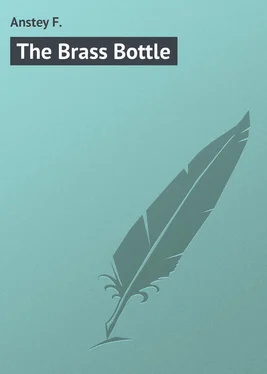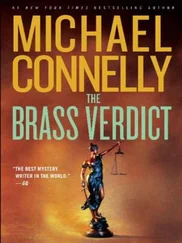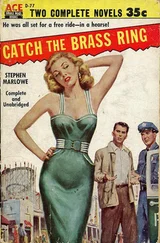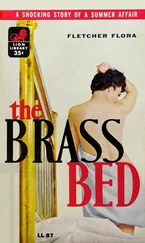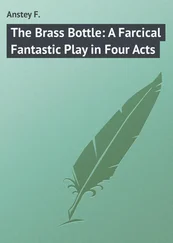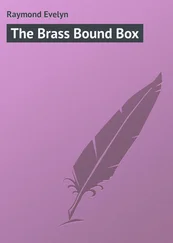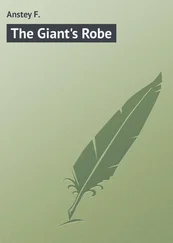F. Anstey - The Brass Bottle
Здесь есть возможность читать онлайн «F. Anstey - The Brass Bottle» — ознакомительный отрывок электронной книги совершенно бесплатно, а после прочтения отрывка купить полную версию. В некоторых случаях можно слушать аудио, скачать через торрент в формате fb2 и присутствует краткое содержание. Жанр: foreign_prose, на английском языке. Описание произведения, (предисловие) а так же отзывы посетителей доступны на портале библиотеки ЛибКат.
- Название:The Brass Bottle
- Автор:
- Жанр:
- Год:неизвестен
- ISBN:нет данных
- Рейтинг книги:3 / 5. Голосов: 1
-
Избранное:Добавить в избранное
- Отзывы:
-
Ваша оценка:
- 60
- 1
- 2
- 3
- 4
- 5
The Brass Bottle: краткое содержание, описание и аннотация
Предлагаем к чтению аннотацию, описание, краткое содержание или предисловие (зависит от того, что написал сам автор книги «The Brass Bottle»). Если вы не нашли необходимую информацию о книге — напишите в комментариях, мы постараемся отыскать её.
The Brass Bottle — читать онлайн ознакомительный отрывок
Ниже представлен текст книги, разбитый по страницам. Система сохранения места последней прочитанной страницы, позволяет с удобством читать онлайн бесплатно книгу «The Brass Bottle», без необходимости каждый раз заново искать на чём Вы остановились. Поставьте закладку, и сможете в любой момент перейти на страницу, на которой закончили чтение.
Интервал:
Закладка:
"I hope I've done nothing wrong," said Mrs. Rapkin, observing his expression; "I only used a little warm ale to it, which is a capital thing for brass-work, and gave it a scrub with 'Vitrolia' soap – but it would take more than that to get all the muck off of it."
"It is all right, so long as you didn't try to get the top off," said Horace.
"Why, the top was off it, sir. I thought you'd done it with the 'ammer and chisel when you got 'ome," said his landlady, staring. "I found them 'ere on the carpet."
Horace started. Then that part was true, too! "Oh, ah," he said, "I believe I did. I'd forgotten. That reminds me. Haven't you let the room above to – to an Oriental gentleman – a native, you know – wears a green turban?"
"That I most certainly 'ave not , Mr. Ventimore," said Mrs. Rapkin, with emphasis, "nor wouldn't. Not if his turbin was all the colours of the rainbow – for I don't 'old with such. Why, there was Rapkin's own sister-in-law let her parlour floor to a Horiental – a Parsee he was, or one o' them Hafrican tribes – and reason she 'ad to repent of it, for all his gold spectacles! Whatever made you fancy I should let to a blackamoor?"
"Oh, I thought I saw somebody about – er – answering that description, and I wondered if – "
"Never in this 'ouse, sir. Mrs. Steggars, next door but one, might let to such, for all I can say to the contrary, not being what you might call particular, and her rooms more suitable to savage notions – but I've enough on my hands, Mr. Ventimore, attending to you – not keeping a girl to do the waiting, as why should I while I'm well able to do it better myself?"
As soon as she relieved him of her presence, he examined the bottle: there was nothing whatever inside it, which disposed of all the hopes he had entertained from that quarter.
It was not difficult to account for the visionary Oriental as an hallucination probably inspired by the heavy fumes (for he now believed in the fumes) which had doubtless resulted from the rapid decomposition of some long-buried spices or similar substances suddenly exposed to the air.
If any further explanation were needed, the accidental blow to the back of his head, together with the latent suggestion from the "Arabian Nights," would amply provide it.
So, having settled these points to his entire satisfaction, he went to his office in Great Cloister Street, which he now had entirely to himself, and was soon engaged in drafting the specification for Beevor on which he had been working when so fortunately interrupted the day before by the Professor.
The work was more or less mechanical, and could bring him no credit and little thanks, but Horace had the happy faculty of doing thoroughly whatever he undertook, and as he sat there by his wide-open window he soon became entirely oblivious of all but the task before him.
So much so that, even when the light became obscured for a moment, as if by some large and opaque body in passing, he did not look up immediately, and, when he did, was surprised to find the only armchair occupied by a portly person, who seemed to be trying to recover his breath.
"I beg your pardon," said Ventimore; "I never heard you come in."
His visitor could only wave his head in courteous deprecation, under which there seemed a suspicion of bewildered embarrassment. He was a rosy-gilled, spotlessly clean, elderly gentleman, with white whiskers; his eyes, just then slightly protuberant, were shrewd, but genial; he had a wide, jolly mouth and a double chin. He was dressed like a man who is above disguising his prosperity; he wore a large, pear-shaped pearl in his crimson scarf, and had probably only lately discarded his summer white hat and white waistcoat.
"My dear sir," he began, in a rich, throaty voice, as soon as he could speak; "my dear sir, you must think this is a most unceremonious way of – ah! – dropping in on you – of invading your privacy."
"Not at all," said Horace, wondering whether he could possibly intend him to understand that he had come in by the window. "I'm afraid there was no one to show you in – my clerk is away just now."
"No matter, sir, no matter. I found my way up, as you perceive. The important, I may say the essential, fact is that I am here."
"Quite so," said Horace, "and may I ask what brought you?"
"What brought – " The stranger's eyes grew fish-like for the moment. "Allow me, I – I shall come to that – in good time. I am still a little – as you can see." He glanced round the room. "You are, I think, an architect, Mr. ah – Mr. um – ?"
"Ventimore is my name," said Horace, "and I am an architect."
"Ventimore, to be sure!" he put his hand in his pocket and produced a card: "Yes, it's all quite correct: I see I have the name here. And an architect, Mr. Ventimore, so I – I am given to understand, of immense ability."
"I'm afraid I can't claim to be that," said Horace, "but I may call myself fairly competent."
"Competent? Why, of course you're competent. Do you suppose, sir, that I, a practical business man, should come to any one who was not competent?" he said, with exactly the air of a man trying to convince himself – against his own judgment – that he was acting with the utmost prudence.
"Am I to understand that some one has been good enough to recommend me to you?" inquired Horace.
"Certainly not, sir, certainly not. I need no recommendation but my own judgment. I – ah – have a tolerable acquaintance with all that is going on in the art world, and I have come to the conclusion, Mr. – eh – ah – Ventimore, I repeat, the deliberate and unassisted conclusion, that you are the one man living who can do what I want."
"Delighted to hear it," said Horace, genuinely gratified. "When did you see any of my designs?"
"Never mind, sir. I don't decide without very good grounds. It doesn't take me long to make up my mind, and when my mind is made up, I act, sir, I act. And, to come to the point, I have a small commission – unworthy, I am quite aware, of your – ah – distinguished talent – which I should like to put in your hands."
"Is he going to ask me to attend a sale for him?" thought Horace. "I'm hanged if I do."
"I'm rather busy at present," he said dubiously, "as you may see. I'm not sure whether – "
"I'll put the matter in a nutshell, sir – in a nutshell. My name is Wackerbath, Samuel Wackerbath – tolerably well known, if I may say so, in City circles." Horace, of course, concealed the fact that his visitor's name and fame were unfamiliar to him. "I've lately bought a few acres on the Hampshire border, near the house I'm living in just now; and I've been thinking – as I was saying to a friend only just now, as we were crossing Westminster Bridge – I've been thinking of building myself a little place there, just a humble, unpretentious home, where I could run down for the weekend and entertain a friend or two in a quiet way, and perhaps live some part of the year. Hitherto I've rented places as I wanted 'em – old family seats and ancestral mansions and so forth: very nice in their way, but I want to feel under a roof of my own. I want to surround myself with the simple comforts, the – ah – unassuming elegance of an English country home. And you're the man – I feel more convinced of it with every word you say – you're the man to do the job in style – ah – to execute the work as it should be done."
Here was the long-wished-for client at last! And it was satisfactory to feel that he had arrived in the most ordinary and commonplace course, for no one could look at Mr. Samuel Wackerbath and believe for a moment that he was capable of floating through an upper window; he was not in the least that kind of person.
Читать дальшеИнтервал:
Закладка:
Похожие книги на «The Brass Bottle»
Представляем Вашему вниманию похожие книги на «The Brass Bottle» списком для выбора. Мы отобрали схожую по названию и смыслу литературу в надежде предоставить читателям больше вариантов отыскать новые, интересные, ещё непрочитанные произведения.
Обсуждение, отзывы о книге «The Brass Bottle» и просто собственные мнения читателей. Оставьте ваши комментарии, напишите, что Вы думаете о произведении, его смысле или главных героях. Укажите что конкретно понравилось, а что нет, и почему Вы так считаете.
